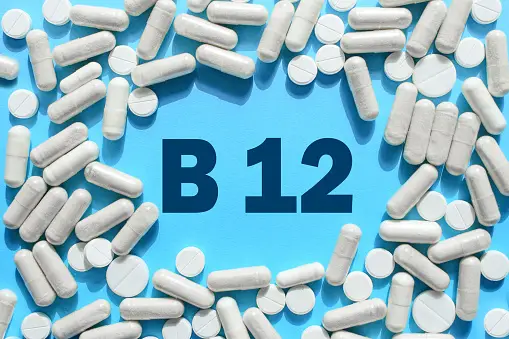Explore how Vitamin B12 injections for weight loss can help. Learn about dosage, effectiveness, potential side effects and B12 injection supplements.
The injectable vitamin B12 supplements have become a favorite for those who are interested in rapid weight loss solutions. One opinion holds that more B12 Vitamins should be in your diet to help fight fatigue, give energy, and stimulate the metabolism. However, other studies are against these findings.
This blog focuses on understanding vitamin B12, its working, the functions of the B12 shot, and the impact of vitamin b12 injections on weight loss.
However, Vitamin B-12 shots for weight loss are becoming highly popular for people whose bodies cannot absorb the vitamin through alternative ways. Although, there are always negative sides and adverse effects.
According to research conducted in 2019, it was observed that patients struggling with the extra fat have lower Vitamin B12 levels, as compared with individuals with an average weight. However, there is a use of supplements and vitamin B12 injections for weight loss as well as for those who feel fatigue and energy loss.
What is vitamin B12?
Often described as cobalamine or B12, this water-soluble vitamin is helpful in maintaining health and various functions.
It helps in DNA formation and red blood cells which further contributes to brain function, heart health, energy production, and much more.
Being water-soluble, Vitamin B12 is present in some foods. Animal-based products as well as certain fortified foods have Vitamin B12. Thus, people who prefer vegetarian food are highly at risk of developing Vitamin B12 deficiency.
To maintain the optimum requirement of Vitamin B12 and to overcome the deficiency, you can take it in the form of an oral dietary supplement in tablet form. Besides, doctors could also prescribe Vitamin B12 supplement injections. Also, these supplements are easy to intake orally in tablet form. It is needed by some individuals whose body fails to generate enough Vitamin B12.
Why do you need Vitamin B12?
Vitamin B12 plays an important role in several key functions of the body. As such B12 is required for the following reasons:
- Supporting the development and proper functioning of the central nervous system.
- Facilitating the formation of red blood cells, essential for oxygen transport throughout the body.
- Aiding in the synthesis of DNA which is basically the fundamental genetic material in cells.
- Assisting in the functioning of two vital enzymes that catalyze various chemical reactions in the body.
Compounds that comprise vitamin B12 are called cobalamin, with cyanocobalamin and hydroxocobalamin being two common forms.
In cases of vitamin B12 deficiency, doctors often administer B12 shots. Vitamin B12 injections are usually given for conditions like pernicious anemia, which impairs the body’s ability to absorb sufficient vitamin B12 through the intestines. Pernicious anemia occurs when there’s a decrease in red blood cells due to insufficient absorption of vitamin B12 by the intestines. Vitamin B12 shot is given directly into a muscle to ensure effective absorption, bypassing any issues with intestinal absorption.

How Vitamin B12 Works?
Recent studies found that there is a connection between obesity and low vitamin B12 levels. This means that people who are overweight often have lower levels of B12 compared to those with a healthy weight. But, it’s important to know that just because there’s a link doesn’t mean getting B12 shots will help you lose weight. Scientists haven’t proven if low B12 causes obesity or if being overweight leads to lower B12 levels.
Some experts believe that people who don’t get enough B12 might have habits that contribute to obesity or other health problems that cause both. On the flip side, not having enough B12 might affect how your body burns energy, which could contribute to weight gain.
Experts say that only people with a confirmed B12 deficiency who can’t absorb the vitamin well by mouth should consider getting B12 shots.
Effects on Body Fat and Metabolism
Very few studies on human research show that vitamin B12 might affect body fat and metabolism.
– Fat Metabolism: One study emphasized the significance of b12 for fat metabolism, and implied that the lack of this vitamin may result in fat deposits and ultimately obesity.
– Animal Studies: A very low level of vitamin B12 during pregnancy in mice highlighted that there is a long-lasting effect on adverse changes such as increasing body weight and high cholesterol levels in the mice. The results of another study on rats indicate B vitamin supplements that helped the reduction of weight and activation of enzymes involved in the metabolism process.
Further detailed studies are required to see if vitamin B12 influences metabolic processes and the amount of fat stored in the human body. Also, findings from animal studies have shown that vitamin B12 deficiency may increase one’s body fat and shift metabolism. However, these discoveries require more human studies for confirmation.

Low Levels May Be Linked to Obesity
Surprisingly, there are a number of researches that indicate a relationship between maintenance of the optimal vitamin B12 level and lower risk of obesity.
- In a research conducted with more than 9000 people it was found that those who have high vitamin B12 blood levels have a lower risk to obesity.
- On the other hand, B12 deficiency can also be related to the risk of being overweight or obese, in a study of more than 1000 persons.
- Children, having less of this vitamin B12, showed signs of being overweight based on their BMI.
Although these studies do not take into account various other factors that might affect weight. Therefore, though B12 levels are related to weight further research investigations are required to confirm the direct effect.
Signs of Vitamin B12 Deficiency
The indication of Vitamin B12 Deficiency can be felt by various symptoms. If vitamin B12 deficiency is the underlying cause, megaloblastic anemia may develop. As a result, it causes
- headache,
- Tiredness and low energy levels
- memory loss,
- appetite loss,
- Weight loss, and
- other related symptoms.
On the other hand, the absence of symptoms does not mean that all people with low vitamin B12 levels are not anemic and the symptoms may be different as well. In such cases, a doctor may issue vitamin B12 supplements if the B12 level is low. Supplements can help bring the B12 level to a healthy range.
Sources of Vitamin B12
Vitamin B12 can be sourced from various foods to overcome the deficiency. Some of the rich sources of Vitamin B12 are:
- Meat such as meat, fish, eggs
- Milk and other dairy products.
- Breakfast cereals
- Plant-based milk
Vitamin B12 supplements are available in various forms such as pills, liquids, and lozenges. They are commonly present in multivitamin supplements. If the diet contains low animal-based calories, substitute with fortified foods or begin supplements to raise up vitamin B12 levels.

How Much B12 Do You Need for Weight Loss?
The National Institutes of Health suggests that adults are recommended to meet 2.4 mcg B12 per day. And this can be simply achieved through regular balanced meals.
If you are wondering whether to use vitamin B12 for weight loss or not, do not overdose it as a high dose of vitamin B12 can result in headaches and upset stomachs.
Vitamin B-12 injections for weight loss
Unfortunately, there is no strong research that proves that B12 shots for weight loss. Vitamin B12 is like any other B vitamin that is very water-soluble. It can be found in many foods that are in nature like meat, fish, and dairy, or on medications that are given as a supplement.
Doctors prefer to use Vitamin B12 shots as a means of treating or preventing conditions like pernicious anemia or Vitamin B12 repletion in certain instances. Some environmental reports have shown that Vitamin B12 can increase the energy plus endurance of the sports person, but it is no proof worth relying on.
If you are a diabetic who has type 2 and you take the drug metformin, it may cause your amount of vitamin B12 to lower. As such you may not need an extra dose of B12 vitamins unless they are prescribed by a doctor, because they can interfere with any drugs or could cause any side effects.
Don’t forget to always try and keep in mind that quick weight loss is not possible. Follow a healthy lifestyle which includes a balanced diet and regular exercise to stay fit in the long run.
Let’s Sum Up
Vitamin B12 is the most important vitamin that your body needs to be able to function well. Enough of it can not just avoid the anemia problem but also make sure to keep your energy levels up. Research shows that vitamin B12 levels, as well as certain metabolic functions, are inversely related to obesity and that vitamin B12 supplementation may further reduce the risk of fat accumulation. However, whether higher than required levels of B12 for weight loss is effective remains unclear at the moment.



